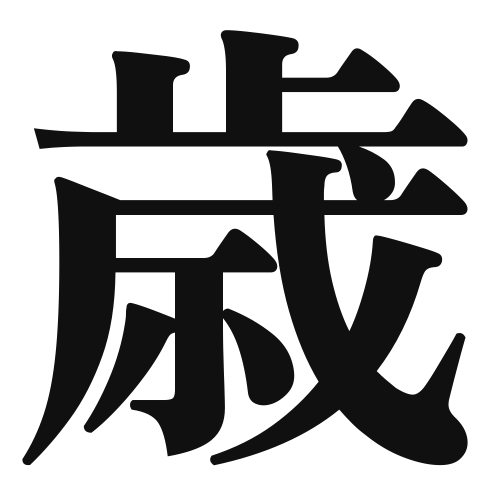1. Overview of Meaning
The kanji “歳” (pronounced “sai” or “toshi”) primarily means “age” or “year.” It is used to indicate the number of years a person has lived or the age of something.
2. Formation and Radicals
The kanji “歳” is a phonetic-ideographic character (形声文字), which combines both meaning and sound. The left part, “十” (ten), suggests a numerical aspect, while the right part, “止” (to stop), can imply a point in time or a specific moment.
The radical for “歳” is “十” (ten), which is often associated with counting or numbers.
3. Examples of Usage
Common words and phrases that include “歳” are:
- 歳月 (さいげつ, saigetsu) – time, years
- 歳末 (さいまつ, saimatsu) – end of the year
- 年齢 (ねんれい, nenrei) – age
Example sentences in daily conversation:
- 彼は30歳です。 (かれは30さいです。) – He is 30 years old.
- 私の犬は5歳です。 (わたしのいぬは5さいです。) – My dog is 5 years old.
4. Synonyms and Antonyms
Similar kanji with related meanings include:
- 年 (ねん, nen) – year; while “歳” refers specifically to age, “年” can refer to any year in a calendar context.
Antonyms include:
- 若い (わかい, wakai) – young; this term contrasts with “歳,” which indicates age.
5. Cultural and Historical Background
The kanji “歳” is deeply connected to Japanese culture, particularly in the context of celebrating birthdays and the New Year. In Japan, the age of a person is often celebrated with special customs and traditions.
Proverbs and idiomatic expressions that include “歳” are:
- 歳を重ねる (としをかさねる, toshi o kasaneru) – to grow older, which reflects the natural process of aging.
